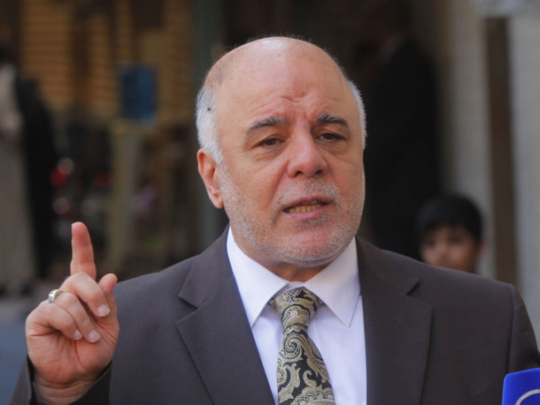
The fall of Mosul to Daesh (the Islamic State in Iraq and the Levant) last June sent shock waves across the region and beyond. Consequences included the removal of the Nouri Al Maliki government in Baghdad and the return of direct US military intervention in the Fertile Crescent. Following the fall of Mosul, US President Barack Obama admitted that sectarian policies had created a fragile situation in Iraq and that “without achieving some sort of political compromise in the divided country, there will be no lasting impact to any support from outside”.
For the US administration, the departure of Al Maliki, along with the formation of a more representative and inclusive Iraqi government that addresses Sunni grievances, was a prerequisite for any meaningful US support in the fight against Daesh. Political reform should hence precede military action, so as to rebuild Arab Sunnis’ confidence in Iraq’s political institutions.
The task of the government of the new Iraqi Prime Minister Haidar Al Abadi was perceived hence as much broader than merely tackling the structural problems that have plummeted Iraq since 2003, such as: rampant corruption; a failure to provide basic services, the lack of security, and the absence of functioning state institutions.
Al Abadi’s first and foremost objective will be the maintenance of Iraq’s national unity. The fall of Mosul represented the most significant threat to the very existence of the state since modern Iraq first emerged in the aftermath of the First World War. Al Abadi will have to repel that threat and ensure that Iraq remains united.
Two challenges will have to be dealt with if Al Abadi wishes to realise this key objective. The first is the political crisis that developed after the 2003 US invasion and brought Iraq’s political system, with its sectarian power-sharing formula, to the brink of collapse. Speaking to parliament on September 8, as he was seeking to win a vote of confidence for his government, Al Abadi announced the broad lines of his reform agenda. Yet, drawn from the same Shiite and Sunni parties that have dominated the political scene in the eleven years following the fall of Saddam Hussain’s regime, Al Abadi’s team is yet to prove that it is capable of pursuing genuine political reform.
Reform is not simply a matter of government formation, nor is it the construction of an alternative ruling elite. First and foremost, it entails a restructuring of the political system and the reformation of the relationship between the different social forces. It also requires a more just distribution of wealth and power in state and society.
The second challenge to Al Abadi’s government is to confront the threat of Daesh. A credible reform agenda can have vital impact in dismantling local support for the extremist group. It is widely agreed that Daesh re-emerged in an atmosphere of increasing resentment that accompanied the formation of the second Al Maliki government in 2010.
Thus, any response to the challenge of Daesh must essentially address, absorb and drain this resentment.
Obviously, this issue was on top of the agenda of the international powers seeking to contain and defeat Daesh. The Americans, in particular, had made their military intervention against Daesh conditional upon the departure of Al Maliki and the formation of a more inclusive Iraqi government. The Paris Conference to support Iraq and Obama’s speech, in which he revealed his plans to confront Daesh, were both timed to serve the same objective.
The announcement of the formation of a National Guard, included in Al Abadi’s plan of action, came about in a similar fashion. The proposal to shift from national to local security provision — that is, to limit the army’s role in dealing with local security issues, and rely instead on locally recruited National Guard forces to provide security provincially — is a key demand of the Sunni community.
In theory, the National Guard will be composed of fighters hailing from the concerned province, under the supervision of the local government, although it will remain part of the official security establishment. In this sense, it differs from the Sahwa militia forces created by the Americans in 2007 to fight Al Qaida. The National Guard will, however, be assigned with the task of implementing the last part of the plan to confront Daesh, that is, the recovery of Daesh-controlled territories.
Indeed, Al Abadi’s efforts to override sectarian governance will face fierce resistance from extremists on both sides of the Iraqi divide. These would include, in addition to Daesh, Shiite militias and extremist political forces aligned with Al Maliki. Al Abadi will have to subdue these challenges if he wishes to succeeded in saving Iraq as an entity a century after its creation.
Dr Marwan Kabalan is a Syrian academic and writer.










